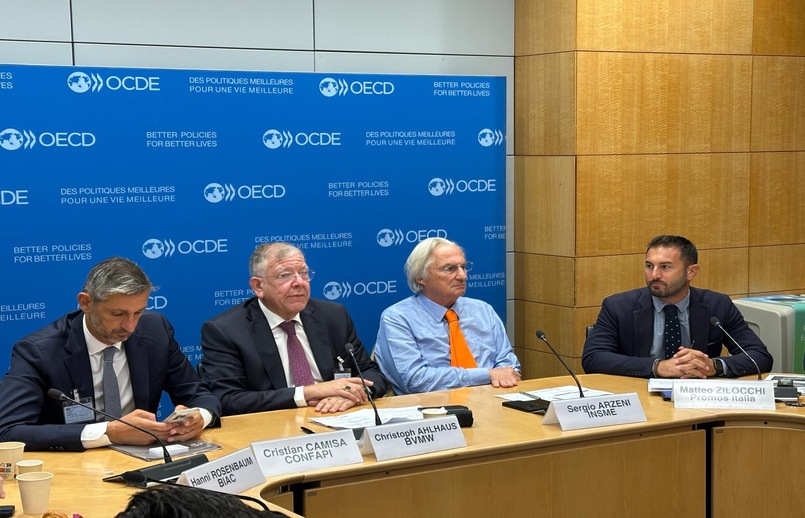Together with BVMW, The German Association of SMEs, INSME was proud to host in early September a closed-door workshop entitled “Challenges Facing SMEs in the New Geopolitical Context”. Taking place at the Organization for Economic Co-operation and Development (OECD) in Paris, the program was envisioned with the rapidly fluctuating global landscape in mind. Thirty representatives and leaders in innovation in the world of SMEs met in Paris for this high-level event.
Throughout the day, INSME President Sergio Arzeni led a dialogue that attempted to realize how SMEs can better prepare themselves to combat the challenges facing them today, together with a roundtable from the INSME network. During the opening speeches, Mr. Cristian Camisa, President of CONFAPI, took the floor to state that reaching energy sovereignty is crucial for Europe, aiming at a co-investing in a pan-European energy network. He pushed for a suspension of the Green Deal for SMEs, as the economic stagnation of this time is already too much of a burden on SMEs. Camisa then stressed how important it is to retain talents: in Italy alone, 8% of high-level graduates leave the country and this trend must be inverted.
Other inhibiting factors have been pointed out by Lucia Cusmano, Head of the SMEs and Entrepreneurship Division at the OECD: seemingly unpredictable U.S. tariffs, wars in Ukraine and the Middle East, as well as shifts in the global supply chain have all limited small and medium-sized enterprises’ competitiveness.
Prof Jay Mitra, a member of the INSME Board, emphasized how small and medium-sized enterprises can become more prominent when interacting with governments and corporations. He presented data on the main players on the field that are examples of this, such as Germany which remains a strong actor in the fields of AI, robotics, and cybersecurity. There is cross-fertilization between civil and defense industries, with existing frameworks and initiatives that facilitate collaboration between these sectors in various countries (CybExer in Estonia, for example).
Ambassador Luca Sabbatucci, the Italian Representative at the OECD, added that the advent of Artificial Intelligence will require the entire sector to adapt. In this regard, the Ambassador emphasized that agile structures such as those of SMEs tend to be more flexible and able to adapt more quickly to innovation than more complex organizations.
Other notes offered by Dr. Raimund Bröchler, who is Netcompany’s SEE & EUI as well as the Vice-President of INSME, suggested that SMEs should invest in resilience and strategize around the digital and green transitions based on the strategic benefits they offer.
Source: INSME Secretariat


